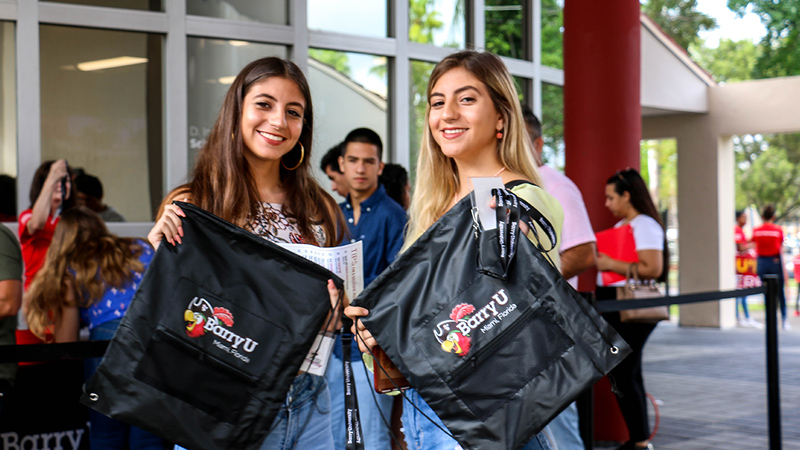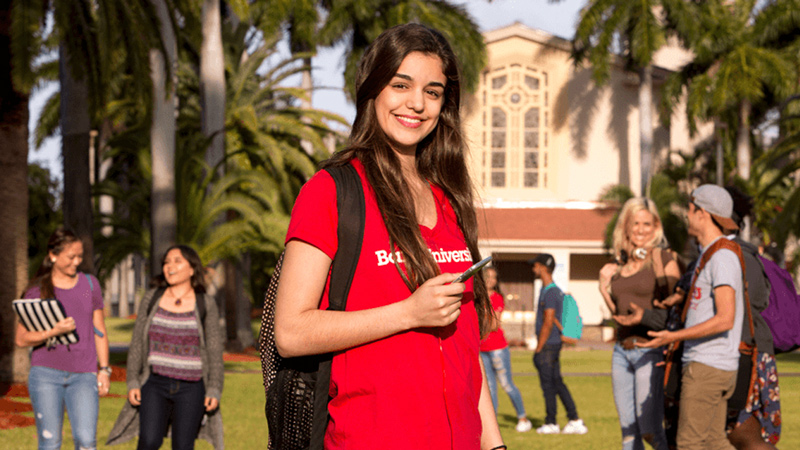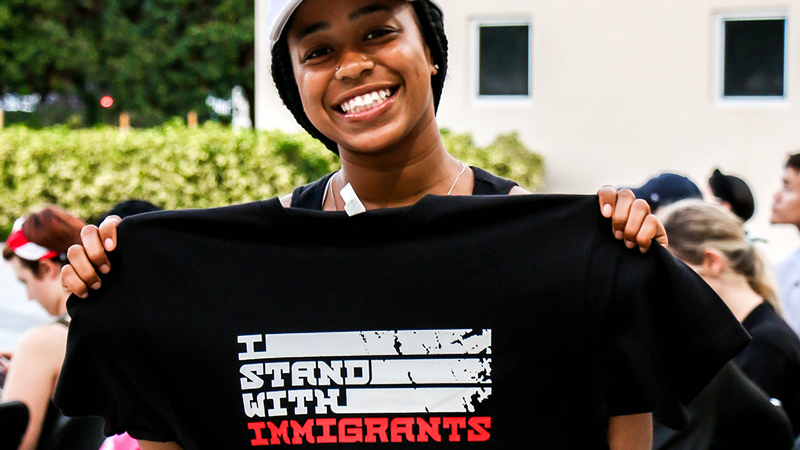In July 2019, Mike Allen joined Barry as its president, and he’s recently contracted with the Board to serve Barry for the next decade. In just a few short years, Dr. Allen’s administration has faced hurricane threats to campus, a global pandemic, and the daily challenges that lie on the higher ed landscape. It’s been an eventful few years, to say the least, but President Allen couldn’t be more proud of the way the Barry community handled the events.

One of President Allen’s favorite days of the year is Commencement. “Graduation is such a special celebration,” says Allen, “the joy of our graduates, watching them celebrate with their families, knowing how many sacrifices they’ve all made to get to that point, but also knowing how well prepared they are for whatever comes next.”
Interview by Blaine Montgomery ’23
Photograph by Carl Juste

Q. What excited you about coming here to lead the University?
A. There are so many things that are special about Barry. But more than anything else, there was this amazing sense of community. Even as an outsider at the time— interviewing and getting to know people—the sense of community was palpable. It was a place that was warm and welcoming. It was a place where you felt energy. It was vibrant. I wanted to be a part of that kind of community
Q. Aside from the immediate issue of the pandemic, what are some challenges that Barry—even higher education—may be facing in the next five to 10 years?
A. One of the outcomes of the pandemic is that the world has changed so much in a short time— and our students are facing uncertainty in the job market and in how those jobs are performed. So a challenge for any university is to adjust to that and to monitor what’s happening in various industries. To see where our students are getting jobs, to see where the growth opportunities are, and then aligning ourselves with those so that our students not only are in the right majors and the right tracks, but then go on to have impactful careers. It can be a challenge for universities to be that nimble, to be able to move quickly to adjust to changing landscapes, but I think Barry is in a good position to do just that
Q. How do you think that Barry is preparing students for today’s world, and what sets Barry apart from other schools?
A. First, our faculty. Our students receive outstanding teaching from our faculty—there’s no question about that. But we couple that teaching with experiential learning— making sure that our students aren’t just learning in the classroom, but that they’re getting real handson experience. For example, we’re having this conversation in the Brinkley Studio, with a junior communications major getting practical experience.
Students also get real-world experience in cybersecurity, in data analytics, in healthcare fields. We have our Student Managed Investment Fund, which is a group of students who come together to invest over a million dollars of the school’s endowment every year, and they often outperform our regular advisors and our regular investment people. Those students go in for their job interviews and can talk about having had this practical experience, of investing money and making hard decisions as markets rise and climb. They are in incredibly high demand upon graduation.
Q. You came to Barry in 2019. You had a few months to get acclimated, but for two years now, we’ve been living through a pandemic. How well do you think Barry responded to the crisis?
A. Some have dubbed me the disaster president because even before the pandemic, there was a Category 5 hurricane off the coast. It was my third week on the job. We, fortunately, were lucky on that one, but the pandemic hit seven or eight months later. It’s been difficult, but it’s also been a rewarding experience to lead the university during this time. So many industries have been completely disrupted by the pandemic, but higher education is very much near the top of the list.
To be honest, in March 2020, we were legitimately worried about our future as a university. We projected confidence, we believed in ourselves, we believed we would make all the right decisions, but the virus was in control, and we were simply responding to what was happening. But now, roughly two years later, we’re not only on solid footing, we’re thriving. That really only happened for one reason: the strength and resilience of our students, faculty, and staff.
Q. How do you measure the success of your administration?
A. When I think of whether or not we’re being successful, I think of our students. My favorite day of the year professionally is graduation. Graduation is such a special celebration—the joy of our graduates, watching them celebrate with their families, knowing how many sacrifices they’ve all made to get to that point, but also knowing how well prepared they are for whatever comes next. When I see that, and I see the success our graduates have after Barry, I try and allow myself to exhale and say, OK, we’re doing things right and making a difference.
Q. You have made community partnerships and contributions to the South Florida community a priority. Why is that so important to you?
A. The core of our mission is advocating for social justice through collaborative service, and that’s what we do every day. One thing I love about this community is that people say “yes,” and they say yes easily and enthusiastically. They embrace opportunities to help others and make a difference. I go to our faculty, our staff, our CCSI organization, our students, and ask them to be involved in community initiatives—Big Brothers Big Sisters of Miami; United Way of Miami; a local group called Honey Shine; Casa Familia, which provides residential living for adults who have intellectual and developmental disabilities. Our students, faculty, and staff always say yes, and they always show up, and that’s a wonderful thing about Barry.
Q. Knowledge and truth, social justice, inclusive community, and collaborative service are integral core commitments to the culture and teaching at the university. What role and responsibility do you believe Barry students, staff, and faculty have in the current national social justice issues?
A. There are many ways our students and faculty contribute to these complicated discussions, but I will highlight two initiatives that we’re particularly proud of. About a year and a half ago we started our Anti-Racism and Equity Coalition on campus. I asked Dr. Phyllis Scott, who’s the former dean of our School of Social Work, to lead this initiative.
The coalition has been making an enormous difference on our campuses, and they’re working to do the same in the wider community. They’re looking at ways to combat systemic racism, systemic inequality. Looking to make sure that our campus is examining these issues, that we are truly the inclusive community that we aspire to be, and that we are a fair and a just community in every way that we aspire to be.
We’re always thinking about how we can lend our expertise to critical issues of the day, like voting rights, access to healthcare, climate change, immigration. Two examples: We have a student on White House panels around climate change, and we recently launched our Institute for Immigration Studies, an academic center dedicated to the study and understanding of the multicultural South Florida immigrant experience. Their work will include, of course, the preservation and understanding of historical immigration experiences, but it will also involve making an impact on current policy. There are many issues that need to be addressed by the great minds of our time. We want our community here at Barry to be leaders in that regard.




















